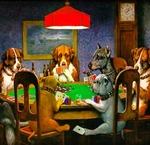Fixing the culture of cheating on veterinary state board examinations
/ Veterinarians rank consistently at the top of the professional respect-o-meter. Turns out the general public thinks we’re not just smart and selfless, but honest, too. What then, I wonder, would they think if they knew it’s common for veterinarians to cheat?
Veterinarians rank consistently at the top of the professional respect-o-meter. Turns out the general public thinks we’re not just smart and selfless, but honest, too. What then, I wonder, would they think if they knew it’s common for veterinarians to cheat?
I delivered that last line salaciously for dramatic effect. But that makes it no less true. Veterinarians in many states effectively cheat on their state board examinations to gain licensure in that state. What’s worse, everyone knows it and thinks nothing of it.
Though I’ve not conducted in-depth research into how far-ranging this practice might be, I’ve personally verified that this kind of institutionalized cheating behavior takes place in both California and Florida.
How do I know? I’ve actually held copies of past state board examinations in my hands. It’s from these that test questions are continually sourced, year after year. So when applicants for licensure in these states have the opportunity to review them, they know roughly what’ll appear on the exam.
This practice is disingenuous, of course. That’s because these past exams are passed around only by those in the know, leaving those who don’t have an “in” to suffer the vagaries of the legal and medical esoterica that make up the bulk of the test questions. (In fact, failure is common for those who don’t have access to these documents.)
The biggest problem here is not just the fact that it’s wrong, but that the practice is deeply ingrained in the culture of the profession. In fact, it’s gotten so that we no longer register that by continuing this tradition, cheating is effectively being sanctioned by regulatory bodies within our profession.
Aside: So you understand, the national board examinations ensure that all veterinary graduates meet a high level of proficiency when it comes to their medical knowledge base. It’s required for all veterinarians in all states. Many states, however, also require that licensees pass an additional examination. Sometimes it’s to prove that license holders understand the laws of the state (as in Florida) but sometimes (as in the case of California) ostensibly to show that veterinarians in that state meet even higher medical standards than the nation as a whole.
Now back to the cheating:
My column in last month’s Veterinary Practice News addressed this issue with an eye towards challenging the status quo and bringing veterinary medicine (kicking and screaming, if need be) into line with the kind of ethical practices our “adoring” public assumes we fervently adhere to.
Here’s an excerpt:
“Cheating in veterinary school is not only expressly verboten, it’s considered highly unethical, morally corrupt and never something to be discussed openly. So why is it that so many of our colleagues are willing to discuss this issue as if it’s a walk in the park?
Well, mostly, because they’ve been lulled by its ubiquity and their peers’ and employers’ blasé attitudes into thinking it’s an acceptable practice. But also because the exam is either completely irrelevant to a life in practice or because it serves as a barrier to entry for the clueless masses the state’s veterinary board hopes to keep at bay. Neither of which is a compelling reason to condone cheating.
Sadly, however, the tacit acceptance has unduly altered our profession’s cultural norms and eroded the moral fabric of our profession, setting uncomfortable precedents for those embarking on a career in veterinary medicine.
Indeed, while those involved may dismiss the moral morass they’re mired in with pithy claims to expedience, they do know their participation in these regulatory shenanigans is absolutely wrong.
When asked to go on the record to help expose and hopefully eliminate these unfair practices, not one interviewee extended a neck. Which I can’t easily condemn. After all, the stage has been set, the players have learned their lines and the curtains won’t come down as long as everyone keeps dancing.
Yet the big question remains: Can a profession that turns a blind eye to this kind of pervasive institutionalized cheating possibly possess the integrity to do right by its membership and its mission?”
“Not likely,” is what I concluded. Though the public can rest assured that pet care won’t be directly compromised by this kind of unethical activity, I doubt that any outsider looking in would warm to the notion that their beloved veterinarian might’ve felt compelled to cheat just to keep up with the crowd.
Now that you know this dirty little secret, how does that make YOU feel? Maybe it makes you want to write your state’s Board of Veterinary Medicine a wittle email … ?
PiC: Cropped version of C.M. Coolidge's "Dogs Playing Poker," 1903. Note the cheating bulldog. ;-)





